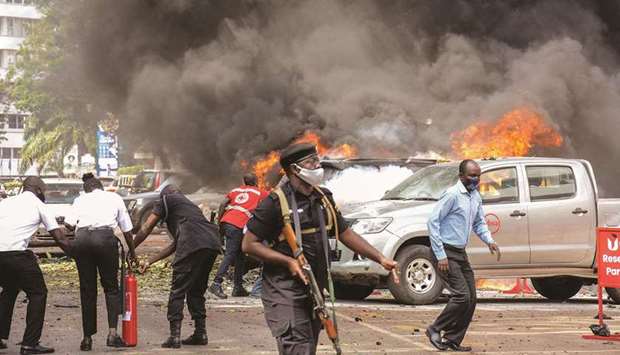Three people died and several dozen were injured in twin suicide bombings targeting Uganda’s capital Kampala yesterday, police said, blaming a “domestic terror group” linked to the Allied Democratic Forces (ADF) for the attacks.
An armed group active in the eastern Democratic Republic of Congo, the ADF has been linked to the so-called Islamic State by Washington and blamed for a string of recent attacks in Uganda.
Two suicide bombers on motorbikes - disguised as local “boda boda” motorcycle taxi drivers - detonated a device near the entrance to parliament, killing a passerby, while a third attacker targeted a checkpoint near the central police station, leaving two people dead, police spokesman Fred Enanga said.
The explosions in Kampala’s central business district occurred within minutes of each other, shortly after 10am, and left “bodies shattered and scattered”, he said.
There was no immediate claim of responsibility but Enanga told reporters: “The indications are that this is a domestic terror group linked to the ADF.”
Police foiled a third attack, recovering an improvised explosive device from the home of an alleged suicide bomber who was shot and injured, and were in pursuit of other members of the group, Enanga added.
The explosion near the police station shattered windows while the one near parliament set cars parked nearby on fire, Uganda’s Assistant Inspector General of police Edward Ochom said earlier. The Ugandan Red Cross said 21 of the 33 people injured were police officers.
The attacks follow two blasts last month — a bus explosion near Kampala that wounded many people and a bombing at a roadside eatery in the capital that killed one woman.
Police said both those explosions were carried out by the ADF. Uganda has also blamed the group for a foiled bomb attack in August on the funeral of an army commander who led a major offensive against Al Shebaab militants in Somalia.
Salim Uhuru, mayor of Kampala Central, said he was near the police station when he heard the blast. “It was so loud. I ran towards the police station and saw one policeman I know dead on the ground. His body was scattered like mincemeat,” Uhuru said. Kyle Spencer, the executive director of Uganda’s Internet Exchange Point, said that the explosions had sparked panic.
“The road to parliament is closed off, there are people just crying, everyone else is just trying to get away from these areas,” he said. Parliament cancelled its session yesterday, asking members to avoid the area “as security forces are working hard to restore order”.
The premises were put under tight security, with heavily armed soldiers securing the area as forensics officers in white overalls inspected the blast site for clues.
Opposition leader Bobi Wine, whose real name is Robert Kyagulanyi, said he was “very sad” about the bombings, which were also condemned by the African Union. Ugandan police last month arrested a number of alleged ADF operatives and warned that extremists were believed to be plotting a new attack on “major installations”.
“Today’s breakthrough attacks show that we still need to do more, to pre-empt, penetrate and prevent deadly attacks by domestic extremists in the days to come,” police spokesman Enanga said.

People extinguish fire on cars caused by a bomb explosion near Parliament building in Kampala, yesterday.
